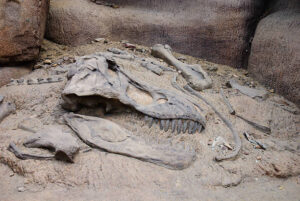
Tourists can hunt for bones on private land, accompanied by a guide, and will receive a finder’s fee for any specimens they manage to track down.
Dinosaur Discoveries will sell the fossils and share half the profit with the landowner. The fossils’ purchasers (be they museums or private
corporations) will do the actual excavation.
By finding fossils, the firm is protecting them from their most serious danger, erosion. However, the company can only operate on private land.
At present, it is illegal for a company like Dinosaur Discoveries to collect fossils on public lands. Only paleontologists with government
permits can collect fossils on public land, and only the government can own fossils from public land (although they can remain in approved
repositories such as museums and universities).
There are only about fifty academic dinosaur paleontologists in the United States. Yet thousands of fossils come to the surface each year, and
the Paleontological Society’s Code of Fossil Collecting states that leaving them uncollected “assures their degradation and ultimate loss” through
weathering and erosion.
Private entrepreneurs and collectors, like Dinosaur Discoveries, argue that private individuals should be allowed access to the fossils on public
lands and ownership of any fossils they find-“finders-keepers.” Many paleontologists disagree. They say that private hunting would remove fossils
from the public sector to private collections, hurting science and education. They also claim that the profit motive would lead to quick,
poor-quality expeditions.
In our view, that way of thinking is behind the times. A number of joint ventures among museums, universities and businesses are ensuring that
valuable scientific discoveries are made in paleontology.
Recently the Chicago Field Museum, with financial support from McDonald’s, Disney World, and other groups, purchased the T-Rex skeleton “Sue.”
Because it was discovered on private property in Montana, it could be sold at auction. Despite the great uproar from scientists who didn’t want it
to be auctioned, but rather donated to a museum, the sale of Sue showed that valuable scientific discoveries can be distributed through the market.
Paleontologist Robert Bakker, curator of the Tate Museum in Casper, Wyoming, admits, “There is a class system. We guys with Ph.D.s think that we
have a Godgiven right to dictate where and how specimens are collected. That is narrow-minded, and not in the public interest.” In fact, many of
history’s most important dinosaur discoveries were made not by professionals, but by amateurs:
-
- Two of the world’s 14 complete T-Rex skeletons (as of 1993) were discovered by Stan Sacrison, a plumber and electrician who spends his spare time
searching for fossils. - The American Museum of Natural History in New York began its dinosaur collection with contributions from wealthy adventurers who sought them
just for fun. - Most of the major fossil collections in English museums, including the famed London Museum of Natural History, owe their impressive
collections to the work of a single English family, the Annings, who took up fossil hunting to support themselves in the early 1800s.
- Two of the world’s 14 complete T-Rex skeletons (as of 1993) were discovered by Stan Sacrison, a plumber and electrician who spends his spare time
Rather than enforcing an elitist regulation that limits discoveries like these, the law should allow private groups to become involved in the
process. It would mean more competition for professional paleontologists, but it also would mean more scientific discoveries and a greater
understanding of the past.
J. Bishop Grewell and Matthew Brown are researchers at PERC.


